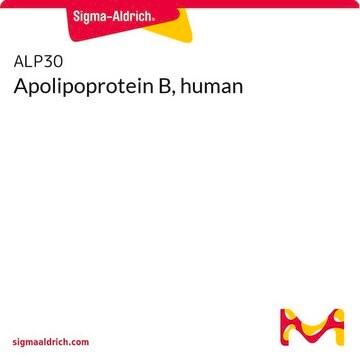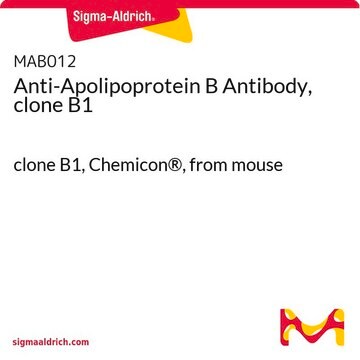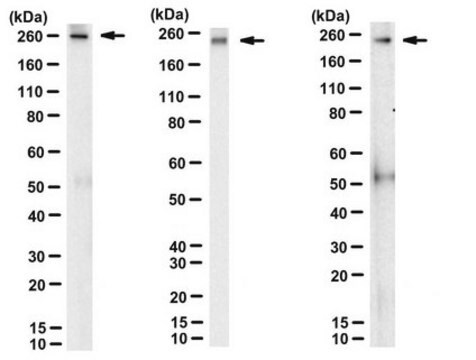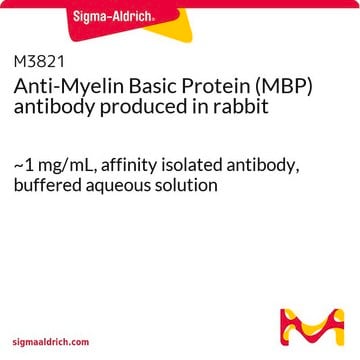AB742
Anti-Apolipoprotein B Antibody
serum, Chemicon®
Synonym(s):
ApoB
Sign Into View Organizational & Contract Pricing
All Photos(1)
About This Item
UNSPSC Code:
12352203
eCl@ss:
32160702
NACRES:
NA.41
Recommended Products
biological source
goat
Quality Level
antibody form
serum
antibody product type
primary antibodies
clone
polyclonal
species reactivity
human
manufacturer/tradename
Chemicon®
technique(s)
immunoprecipitation (IP): suitable
western blot: suitable
NCBI accession no.
UniProt accession no.
shipped in
dry ice
target post-translational modification
unmodified
Gene Information
human ... APOB(338)
Specificity
Apolipoprotein B. Monospecific by IEP with neat antibody vs. 2X pooled human serum and neat pooled human plasma.
Immunogen
Purified human Apolipoprotein B.
Application
Anti-Apolipoprotein B Antibody is an antibody against Apolipoprotein B for use in IP & WB.
Research Category
Metabolism
Metabolism
Research Sub Category
Lipid Metabolism & Weight Regulation
Lipid Metabolism & Weight Regulation
Western Blot
Immunoprecipitation
Optimal working dilutions must be determined by the end user.
Immunoprecipitation
Optimal working dilutions must be determined by the end user.
Physical form
Defibrinated, delipidized and absorbed by solid phase chromatography as required. Goat antisera in 0.05M Tris-HCl pH 7.5, 0.5M NaCl with 0.1% sodium azide.
Storage and Stability
Maintain at -20°C in undiluted aliquots for up to 12 months. Avoid repeated freeze/thaw cycles.
Analysis Note
Control
Liver, HepG2 cells
Liver, HepG2 cells
Legal Information
CHEMICON is a registered trademark of Merck KGaA, Darmstadt, Germany
Disclaimer
Unless otherwise stated in our catalog or other company documentation accompanying the product(s), our products are intended for research use only and are not to be used for any other purpose, which includes but is not limited to, unauthorized commercial uses, in vitro diagnostic uses, ex vivo or in vivo therapeutic uses or any type of consumption or application to humans or animals.
Not finding the right product?
Try our Product Selector Tool.
Storage Class Code
12 - Non Combustible Liquids
WGK
WGK 1
Flash Point(F)
Not applicable
Flash Point(C)
Not applicable
Certificates of Analysis (COA)
Search for Certificates of Analysis (COA) by entering the products Lot/Batch Number. Lot and Batch Numbers can be found on a product’s label following the words ‘Lot’ or ‘Batch’.
Already Own This Product?
Find documentation for the products that you have recently purchased in the Document Library.
Erythrocyte-bound apolipoprotein B in relation to atherosclerosis, serum lipids and ABO blood group.
Klop, B; van de Geijn, GJ; Bovenberg, SA; van der Meulen, N; Elte, JW; Birnie, E; Njo et al.
Testing null
Rene C Adam et al.
Journal of lipid research, 61(9), 1271-1286 (2020-07-11)
Angiopoietin-like protein (ANGPTL)3 regulates plasma lipids by inhibiting LPL and endothelial lipase (EL). ANGPTL3 inactivation lowers LDL-C independently of the classical LDLR-mediated pathway and represents a promising therapeutic approach for individuals with homozygous familial hypercholesterolemia due to LDLR mutations. Yet
Jelske N van der Veen et al.
Journal of lipid research, 58(4), 656-667 (2017-02-06)
Mice lacking phosphatidylethanolamine N-methyltransferase (PEMT) are protected from high-fat diet (HFD)-induced obesity and insulin resistance. However, these mice develop severe nonalcoholic fatty liver disease (NAFLD) when fed the HFD, which is mainly due to inadequate secretion of VLDL particles. Our
Kyung-Hyun Cho et al.
Experimental & molecular medicine, 39(2), 160-169 (2007-04-28)
In our previous study, two point mutants of apolipoprotein A-I, designated V156K and A158E, revealed peculiar characteristics in their lipid-free and lipid-bound states. In order to determine the putative therapeutic potential of these mutants, several in vitro and in vivo
Sara Calattini et al.
The Journal of biological chemistry, 290(38), 23173-23187 (2015-08-01)
Lipoprotein components are crucial factors for hepatitis C virus (HCV) assembly and entry. As hepatoma cells producing cell culture-derived HCV (HCVcc) particles are impaired in some aspects of lipoprotein metabolism, it is of upmost interest to biochemically and functionally characterize
Our team of scientists has experience in all areas of research including Life Science, Material Science, Chemical Synthesis, Chromatography, Analytical and many others.
Contact Technical Service








